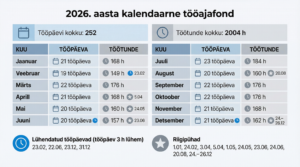
Salary agreements are the foundation of every employment relationship. But did you know that in Estonia it is crucial to agree on gross salary, not net salary? Many employees don't understand the connection between the two – and this can cause confusion, surprises, and misunderstandings for both employer and employee.
📌 What is gross salary and net salary?
- Gross salary is the salary before taxes and fees are withheld.
- Net salary is the amount that is credited to the employee's account after taxes are deducted.
For example, if the gross salary is €1,500, the net salary depends on the amount of tax-free income, the employee's age, whether they receive a pension, whether they have children, etc. Therefore, the employer cannot guarantee a specific net salary, because it depends on individual tax calculations.
⚠️ Why shouldn't you agree on a net salary?
Section 29 of the Employment Contracts Act (ELA) states that wages are paid in cash and the taxes and contributions prescribed by law are deducted from the agreed wages. In practice, this means that The law requires an agreement on gross remuneration., not in net amount.
If the employer and employee agree on a net salary, the employer must pay the employee a monthly afterwards calculate how much gross salary needs to be paid so that the employee receives the desired net amount. This means:
- Additional work for the accountant
- Increased tax risks
- Possible errors and misunderstandings
Gross salary is clear, transparent and unambiguous. It allows the employer to accurately estimate labor costs and the employee to understand how much of their salary is taxed.
📊 How does the tax gap arise for the employer?
If the agreement is a net salary, the employer may to change from month to month, because tax-free income and other factors affect the gross salary that needs to be paid to achieve the desired net amount.
For example, for a net salary of €1,000, the employer's salary costs may differ by €364.02:
|
|
🧾 Gross salary (€) |
🧮 Employer taxes (€) |
💸 Total cost to the employer (€) |
📉 Difference (€) |
|
1. Income tax exemption + 0% funded pension |
1115,44€ |
377,02€ |
1492,46€ |
|
|
2. Income tax exemption does not apply + 6% funded pension |
1387,50€ |
468,98€ |
1856,48€ |
+364,02€ |
🎓 Educating employees: why gross salary is fair and understandable
Many employees don't know how much tax is deducted from their salary. If the salary is agreed as gross, the employee will see exactly:
- How much do taxes make up?
- How much is tax-free income?
- How much goes to pension and insurance?
This helps the employee better understand the Estonian tax system and assess their income as a whole.
📣 GROW recommendation: Always agree. gross salary. It is transparent, fair, legal and helps avoid confusion. Educate your employees about taxes – an informed employee is a motivated employee.



